Smoky, spicy, meltingly tender, boldly flavored, rich and meaty, southern barbecue is popular fare from New England to California. Traditionally found through the South and Southwest – from North Carolina down to Georgia and all the way west to Texas – it’s now enjoyed across the country. There are regional styles, hotly debated cooking techniques, favorite meats and, most controversially, the preferred type of sauce, but it’s all delicious.
Just to make sure we’re all on the same part of the grill, I’m not talking about some burgers or brats over glowing charcoal. That’s grilling. (Although that would be called barbecue in Australia, as in, “throw a few shrimps on the barbie.”) Barbecue is (loosely) defined as cooking meat long and slow, usually twelve or more hours, with indirect heat in a device called a smoker or pit. The smoke flavor is a crucial part of the final result, along with an often-secret spice dry rub or marinade applied several hours before cooking.
Most often the meat is pork, although beef brisket is more common the further west you go. The burnt and blackened ends of the meat are particularly prized. Sometimes you see chicken, turkey or sausages, but these do not cook for hours like the meats. As I say, this is a loose definition. Barbecue has a local identity that can change every 50 miles or so, just like the regional variations in chowder along the New England coast.
Barbecue sauces are a subject of endless discussion. There are at least four basic styles: mustard, vinegar, tomato paste, or ketchup based. Combinations and permutations of these basic flavors, plus loca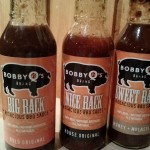 l preferences, create an endless range of choice. Sauces are often sweetened with sugar, brown sugar, molasses or sorghum depending on the region. Maple syrup is a northern variation on the sweet theme. Sometimes the sauce is mopped on the meat as it cooks, but more often it’s sauced after cooking. Barbecue restaurants usually have their house sauce plus a few variations: hotter or sweeter or one that showcases another regional style.
l preferences, create an endless range of choice. Sauces are often sweetened with sugar, brown sugar, molasses or sorghum depending on the region. Maple syrup is a northern variation on the sweet theme. Sometimes the sauce is mopped on the meat as it cooks, but more often it’s sauced after cooking. Barbecue restaurants usually have their house sauce plus a few variations: hotter or sweeter or one that showcases another regional style.
 There are a number of excellent close-by barbecue purveyors. Bobby Qs in Westport is one of the longest established – hardwood smoking their award-winning Saint Louis style “cue” since 2004 and dressing it with their house recipe sauce. Ribs, pulled pork, sausage, turkey breast, pulled chicken and beef brisket all pass through the smoker. Share their massive Pitmaster Platter for a taste of it all. A full menu of starters includes some traditional and others inventive. We enjoyed the warm spinach dip, but the Fried Pickle Chips, Sausage Nuggets and Cousin Nick’s Wings were tempting, too. Take some to go, so you have room for the excellent and very chocolatey Peanut Butter Mousse Pie.
There are a number of excellent close-by barbecue purveyors. Bobby Qs in Westport is one of the longest established – hardwood smoking their award-winning Saint Louis style “cue” since 2004 and dressing it with their house recipe sauce. Ribs, pulled pork, sausage, turkey breast, pulled chicken and beef brisket all pass through the smoker. Share their massive Pitmaster Platter for a taste of it all. A full menu of starters includes some traditional and others inventive. We enjoyed the warm spinach dip, but the Fried Pickle Chips, Sausage Nuggets and Cousin Nick’s Wings were tempting, too. Take some to go, so you have room for the excellent and very chocolatey Peanut Butter Mousse Pie.
PItmaster Ed Wilson presides over the cooking at Wilson’s Real Pit Barbecue in Fairfield. The menu tours the major BBQ locales, including Eastern Carolina Pulled Pork, Memphis and St. Louis Style Ribs, Texas-Style Brisket, and Sausage. Traditional sides include collard greens, baked beans, mac & cheese, corn bread and biscuits.
The barbecue industry is very self congratulating with many contests, festivals, cook-offs and even TV shows that give out hard-won awards and accolades. Both Bobby Q’s and Wilson’s rightfully claim their share of honors and celebrity praise. Many of these festivals celebrate the blues along with barbecue – natural partners, both hailing from the South. Barbecue also goes well with beer, a frequent partner at many festivals.
There are a couple of good options for getting barbecue in Norwalk. B.J. Ryan’s Banc house has a full menu of slow-cooked wood-smoked BBQ, traditional and creative sides, with a flexible menu that allows for easy ordering of any combination of your favorites. Banc is an acronym for Barbecue & Crab. Jeff’s BBQ and Catering no longer has a restaurant in Norwalk offering their award winning BBQ, but their authentic coastal Gullah style BBQ is available for catered events.
You can’t beat barbecue right out of the pit. I recently was fortunate to attend a church dinner where the smoker was right in the parking lot and the meat came directly off the rack to the carving board! Local chef Jacob Hamilton,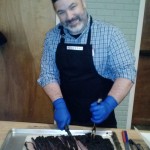 borrowed a smoker on a trailer from a chef friend, got 120 pounds of beef brisket from Allen Brothers meats of Chicago, and set to work making barbecue for 100 men at Hope Church in Wilton.
borrowed a smoker on a trailer from a chef friend, got 120 pounds of beef brisket from Allen Brothers meats of Chicago, and set to work making barbecue for 100 men at Hope Church in Wilton.
For the dinner on Friday night the process began at 9:00 Thursday morning with a dry rub of brown sugar, salt, cumin, coriander, spanish paprika and cayenne pepper. The briskets went into the smoker fired by local hardwoods (oak, cherry and maple) at 5:00 PM Thursday to cook overnight. The trick is to maintain the indirect heat at around 200 degrees – hot enough to cook, but not hot enough to dry out the meat. Jacob and his team stayed the night to maintain the fire, adding coals from a separate fire pit, rather that whole logs. Barbecue is hard work!
I’m told that the fragrant smoke stirred some local interest. The police, among others, stopped by to check it out, offer cooking advice, and take in the tantalizing aromas. The pastor, who lives nearby, confessed that the aromatic smoke from the barbecue was a day-long distraction.
The finished briskets, charred dark and crusty but moist and tender when sliced had the hungry crowd lining up, topping their brisket with Jacob’s ketchup-based sauce seasoned with ginger, jalapeno, red wine vinegar, coffee, and brown sugar. The rub, sauce, and cooking were all typical of barbecue, but not chasing any particular regional style. Jacob was doing his own thing. The guys loved it!
Take a tour of local barbecue restaurants. You might start talking with a southern drawl, ya’ll.
Bobby Q’s
www.bobbyqsrestaurant.com
Wilson’s Real Pit Barbecue
www.wilsons-bbq.com
B.J. Ryan’s Banc House
www.bjryans.com
Jeff’s BBQ and Catering
www.jeffsbbqandcatering.com
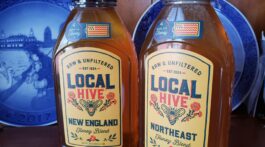
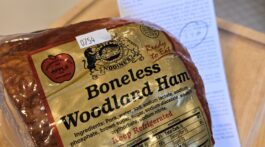
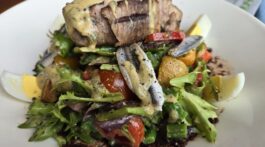
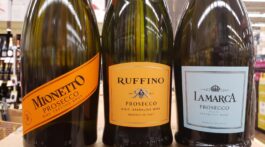
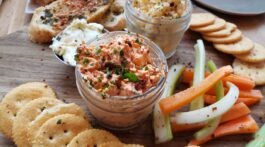


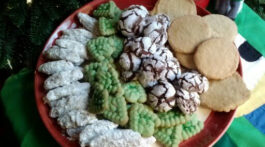
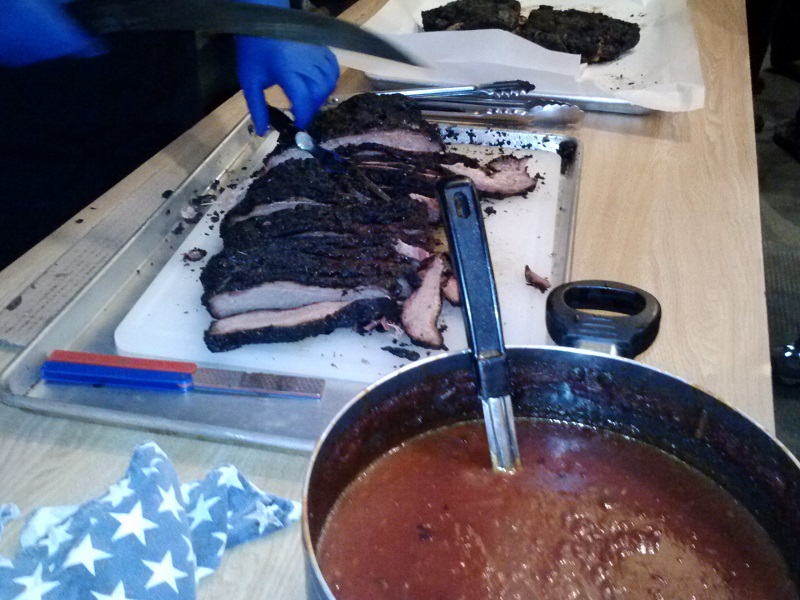

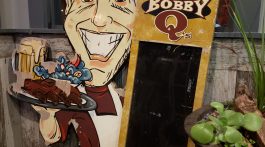
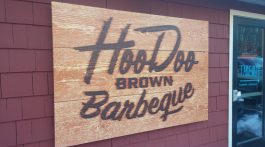
No Comment